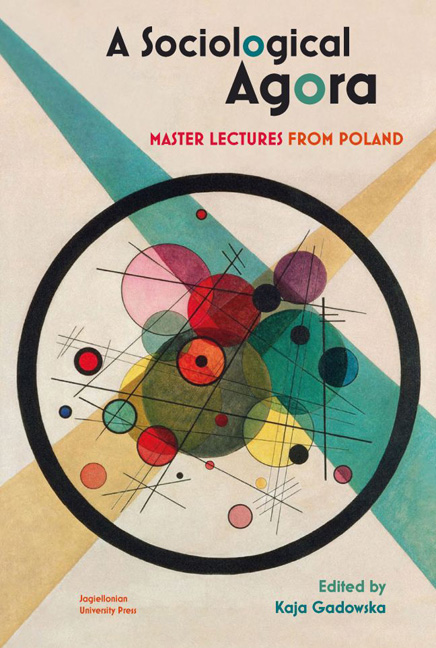Book contents
- Frontmatter
- Contents
- Society in a Time of Pandemia: Postmodern Problems from a Social and Humanistic Perspective
- Trust and Risk in the Time of Pandemia
- The Mythologized Populist Imagination, Carnival Rebellion, and the Fate of Liberal Democracy
- Applied Feminism: Women’s Rebellion and Identity
- On Law and its Interpretative Artifacts
- On Legal Nihilism Once More: Lessons from Poland
- Minima iuridica: Reflections on certain legal (un)obviousnesses
- Community—Meaning What?
- An Essay on Welfare: Problematic and Debatable Issues
- Sources of an Ecclesiastical System Success
- About the Authors
- About the Editor
- About the Translator
- Polish Sociological Association
Minima iuridica: Reflections on certain legal (un)obviousnesses
Published online by Cambridge University Press: 01 March 2024
- Frontmatter
- Contents
- Society in a Time of Pandemia: Postmodern Problems from a Social and Humanistic Perspective
- Trust and Risk in the Time of Pandemia
- The Mythologized Populist Imagination, Carnival Rebellion, and the Fate of Liberal Democracy
- Applied Feminism: Women’s Rebellion and Identity
- On Law and its Interpretative Artifacts
- On Legal Nihilism Once More: Lessons from Poland
- Minima iuridica: Reflections on certain legal (un)obviousnesses
- Community—Meaning What?
- An Essay on Welfare: Problematic and Debatable Issues
- Sources of an Ecclesiastical System Success
- About the Authors
- About the Editor
- About the Translator
- Polish Sociological Association
Summary
INTRODUCTION
The title of my lecture alludes to a well-known work by Theodor Adorno—even if some will find the very comparison too far-reaching, completely inappropriate, and, therefore, wholly unlicensed. Consider this nothing more than a simple paraphrasing or wordplay serving to rouse the author's imagination—reflections and loose associations inspired by the title (but unconnected with the contents) of the German philosopher's treatise. Upon my first contact with Adorno's book, the phrase minima moralia evoked associations with an elementary morality; only later did I realize that the volume is about something else entirely. Nonetheless, the initial impression has remained and become a source of inspiration. For Adorno, the minima moralia concept pertained more to form than content; in the ponderings at hand, however, the Latin words reference both—brief forms (minima) regarding legal fundamentals (minima iuridica).
However, inasmuch as Adorno's book was very pessimistic and dealt with “reflections on damaged life,” this text aims to be optimistic and to comment on the “legal obviousnesses” embodied in familiar Latin sayings and phrases. Yet, just in case, the prefix “un-” is parenthesized because, as life has often shown, these obviousnesses are not so obvious (although they should be) for all lawyers. Both titles (Adorno's and mine) share, however, a certain idea awakened in the author's mind: just as a trampling of moral minimums (a minima moralia albeit bearing a completely different sense than in Adorno) can lead to damaged life, so, too, violations of legal obviousnesses (i.e., the minima iuridica, applying precisely this meaning herein) can, sooner or later, result in damaged law.
The best attestation to the possibility of linking minima moralia with minima iuridica thus understood is (in some symbolic sense), on the one hand, the celebrated novella by Louis Aragon, Le droit romain n’est plus (Roman law has ceased to exist), and, on the other hand, a well-known poem by Mieczysław Jastrun, Z pamiętnika byłego więźnia obozów koncentracyjnych (From the diary of a former concentration camp prisoner). These are linked symbolically because, when confronted with the barbarianism of Nazism, Roman law must indeed have ceased to exist momentarily.
- Type
- Chapter
- Information
- A Sociological AgoraMaster Lectures from Poland, pp. 119 - 146Publisher: Jagiellonian University PressPrint publication year: 2023

